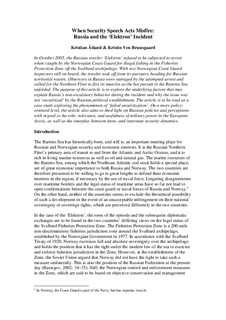| dc.description.abstract | In October 2005, the Russian trawler Elektron refused to be subjected to arrest when caught by the Norwegian coast guard fishing illegally in the Fisheries Protection Zone off the Svalbard archipelago. With two Norwegian coast guard inspectors still on board, the trawler took off from its pursuers, heading for Russian territorial waters. Observers in Russia were outraged by the attempted arrest and called for Russia's Northern Fleet to flex its muscles as the hot pursuit in the Barents Sea unfolded. The purpose of this article is to explore underlying factors that may explain Russia's non-escalatory behavior during the incident and why the issue was not 'securitized' by Russia's political establishment. The article is to be read as a case study exploring the phenomenon of 'failed securitization'. On a more policy-oriented level, it also aims to shed light on Russian policies and perceptions with regard to the role, relevance, and usefulness of military power in the European Arctic, as well as the interplay between intra- and interstate security dynamics. | |
